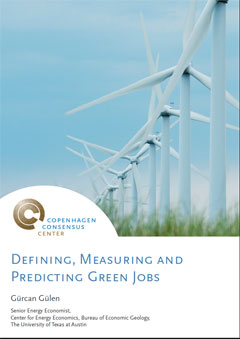The Obama administration, environmental advocates and many other groups have touted the potential of various green energy technologies to create millions of new well paying jobs in the US. Such projections were often used to sell green energy approaches before the financial crisis and great recession, and more recently as an important strategy in the effort to create more US jobs after the recession with the still stubbornly slow job growth in the country.
But what will really be the impact of green technologies on job creation? That's a question tackled by Gurcan Gulen, an economist at the University of Texas, who was commissioned by the Copenhagen Consensus Center, a group that says it "is a think-tank based in Denmark that tells governments and philanthropists about the best ways to spend aid and development money."
In a new report, Gulen says that net new job creation from green technologies and investments is vastly overstated by most estimates, and maybe just as importantly, beyond this specific issue shows how any such reports and calculations are utterly dependent on assumptions, definitions, and myriad other factors. That should leave anyone to be a lot more dubious of numbers on any subject from any source unless they thoroughly understand those factors and assumptions.
The report (available here: Defining, Measuring and Predicting Green Jobs), begins with a convincing case that the types of factors mentioned above should be well understood before touting or believing the green job creation estimates.
For instance, definitional problems abound, leading the US Bureau of Labor Statistics to solicit input on the definition of a "green" job in 2010. As just one example, "Jobs created are not always separated between construction jobs, which are temporary, and operation jobs, which are long-term," Gulen notes. Another example is work constructing and operating nuclear power plants, which some studies or officials include under green jobs and others don't.
He also notes that "Jobs may not be “new” in that already employed people will be doing “green” work. Given the challenge of defining these jobs, counting an existing job as “new” doubles the chance of a miscount."
An easy example might be an engineer switching from designing an engine based on traditional gasoline to one running on biofuels. While that transition may be a good thing, it really isn't a new job, yet many estimates would count it as such.
Gurnen says that many studies have found or assumed that "green" jobs will for some reason pay more than other similar jobs, to which he says "that in the absence of more granular look at types of jobs and skill levels, this assertion is hard to justify. For example, there is no a priori reason to expect a generic construction job at a wind farm site will pay more than a similar position at another power plant site."
 Some studies going so far as to claim truck drivers using new bio-diesel fuel as a green job creation, when they likely have simply switched from another type of truck. Other studies have included truck driver efforts to deliver blades to windmill makers or farms as a green job, even though that would be likely just a small part of what a given driver moves each year. Some studies going so far as to claim truck drivers using new bio-diesel fuel as a green job creation, when they likely have simply switched from another type of truck. Other studies have included truck driver efforts to deliver blades to windmill makers or farms as a green job, even though that would be likely just a small part of what a given driver moves each year.
Then there is the issue of jobs lost. In many studies, he says, the jobs in new technologies are counted as jobs gained, but without offsetting that by the jobs lost in the switch. In many cases, it is a "wash" at best.
Using common sense, Gulen says "Green technologies will replace demand for conventional fuels and technologies, which will undoubtedly lead to lay-offs in these industries" - a fact some studies do not account for, he says. Or, if green energy technologies cost more per unit of power, that means consumers and businesses will have less money to spend in other areas, leading to job losses in areas utterly unrelated to green energy, again a fact not often considered.
Similar issues arise with regard to "opportunity costs," which Guren says is a subject almost always ignored in green jobs studies. When a dollar is invested in alternative technologies, the same dollar is not available for other sectors - which Guren says in many cases would create more jobs per dollar of investment.
"Alternative energy technologies, energy efficiency and conservation and other environmentally friendly programs have benefits ranging from lower emissions to enhanced energy security, albeit at different levels for different technologies or approaches," Guren concludes. "But adding “net jobs” cannot be defended as another benefit of investing in these technologies."
While he says that it is possible to develop models that can show net job gains over a certain period of time under certain scenarios, these are based on "aggressive and unrealistic assumptions of continuous and fast technological innovation, rapid progression of economies of scale, global implementation of similar green policies, adoption of protectionist measures such as tariffs or local content requirements and others."
Readers can agree or disagree with Guren's findings, but the work and research will help almost anyone to become a better evaluator of projections from sources in any topic by seeing where the biases in the numbers might lie.
What is your reaction to Guren's take on Green job creation? Agree or disagree - and why? Let us lnow your thoughts at the Feedback button below.

TheGreenSupplyChain.com is now Twittering! Follow us at www.twitter.com/greenscm
|